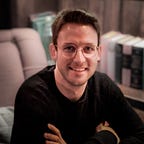The Future of Learning
We can’t outpace the half-life of knowledge, but we can change how we think
“A wise man can learn more from a foolish question than a fool can learn from a wise answer.” — Bruce Lee
In the past four years, I have asked a lot of foolish questions:
Can I be a professional translator without any credentials?
If I want to be a published writer, should I still ghostwrite for money?
Do summaries of existing book summaries make any sense?
The seemingly obvious answer to them all is “no,” yet I did all those things anyway. And while some led nowhere, others now pay my bills. Often, the only way to get satisfying answers is to try, especially with foolish questions. The beauty of daring to ask them, rather than accepting the answers society gives you, is that you’ll have many more unexpected insights along the way.
Like that, today, the answers are always less valuable than the questions.
The Half-Life of Knowledge
In 2013, we created as much data as in all of the previous history. That trend now continues, with total information roughly doubling each year. Michael Simmons has crunched the numbers behind our knowledge economy:
